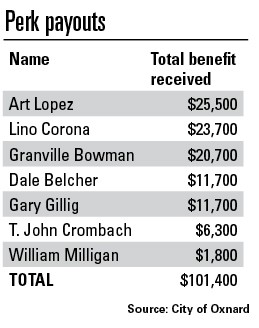Oxnard’s city attorney is trying to claw back $101,400 from seven city officials who benefited from an allegedly illegal retirement perk set up by Ed Sotelo, the former city manager at the heart of a corruption probe that began in 2010.
The city filed a lawsuit March 14 stemming from a $300-per-month additional retirement benefit that, the suit alleges, Sotelo set up in 2003 without the City Council’s approval. A probe by the Ventura County District Attorney’s Office found the benefit was against the law because it sidestepped the council. The city now wants those funds returned.
The complaint filed in Ventura County Superior Court names former city Treasurer Dale Belcher, former Public Works Director Granville Bowman, former Director of Human Resources Lino Corona, former Fire Chief William Milligan, former City Attorney Gary Gillig and two former police chiefs, T. John Crombach and Art Lopez.
Crombach has been an assistant sheriff in Ventura County for three years and announced recently that he will retire at the end of this month. A call to Crombach at the sheriff’s office was not returned.
Lopez, the other former police chief, now runs a company called North American Security in Los Angeles and declined to comment. Belcher declined to comment. An attorney representing Gillig said he had not yet seen the lawsuit and would not comment. Bowman, Milligan and Corona could not be reached.
Current Oxnard City Attorney Stephen Fischer, who is leading the suit, did not return a call for further comment on the complaint.
Corruption probe

The payments to the seven former officials came to light in a 2010 corruption probe at City Hall. After a two-year investigation, Ventura County District Attorney Greg Totten’s office said it had uncovered significant waste of taxpayer money by Sotelo, then-Mayor Tom Holden and other Oxnard city officials but that there wasn’t enough evidence to meet the standards for criminal prosecution.
Among the issues it raised was the supplemental post-retirement benefit program, which the city alleges in its lawsuit was found to be unlawful because Sotelo “acted unilaterally and in the absence of any action by the City Council.”
Oxnard’s code doesn’t allow the city manager to set benefits for city staff, it said. The perks came out of Oxnard’s general fund, rather than a specific fund set up for the program.
Sotelo set up the program in 2003, the city said. The policy promised a $300-per-month retirement perk to any city manager, assistant city manager, deputy city manager, city attorney or department director who had been in such a position for at least five years and retired after July 1, 2003.
Gillig, then the city attorney, “published the policy in the administrative manual of the city at least as early as January 2008,” the lawsuit alleges.
Gillig retired in 2008. Sotelo’s contract with the city expired in February 2013. He was on paid administrative leave throughout the D.A.’s two-year probe.
In May 2012 the City Council voted to terminate the retirement perk and stopped making payments to the seven named defendants. In August 2013, at the request of the City Council, Fischer sent letters to the seven retirees asking for repayment of the money they had already received. Each official had received less than $26,000 in total, according to the city.
Fischer sent a follow-up letter in October, the suit alleges, but the city has not received any responses.
Public pay in the spotlight
The city’s claims come as a proposal to put pension reform on the November ballot circulates in Ventura County. The push to turn the county’s pension program from a defined-benefit into a 401(k)-style system has generated heated debate on both sides. The issue gained steam after the Business Times reported that retired Ventura County sheriff Bob Brooks was suing the county asking for a retirement perk of $75,000 to supplement his existing $283,000 annual pension.
“This is all happening in the context of the Bell scandal,” said Monte Widders, who was the city attorney of Ojai for 35 years and is now of counsel for Ventura-based law firm Myers, Widders, Gibson, Jones & Feingold. “There is much more awareness and public interest in government-pay issues now.”
The court will have to untangle a lot of legal issues in the case, including whether the city can claw back funds paid to the retirees years ago. “I suppose that’s the issue here,” Widders said.
Whether the employees had an obligation to make sure the funds they received were lawful is another. “I can tell you that if my city manager had come to me when I was the attorney at Ojai, and said ‘Hey, I’m going to give you an additional retirement benefit but don’t tell the City Council,’ I would have been very worried,” Widders said.






 Print
Print Email
Email
















